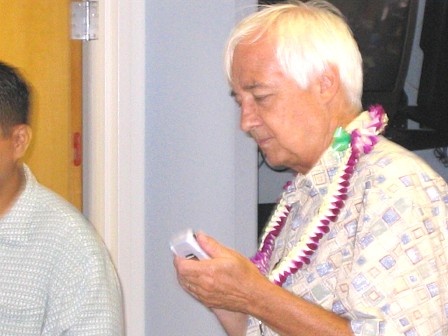
Nov. 15, 2004
Emily Viglielmo, managing editor, Pacific Media Publishing, has been elected president of the local SPJ board for the second year.
Cathy S. Cruz, Pacific Basin Communications, will be vice president, and treasurer is Dave Briscoe, bureau chief of The Associated Press.
Larry LeDoux, faculty adviser for Kalamalama and journalism instructor at Hawaii Pacific University, remains secretary.
Directors are:
Aug. 31, 2004

Bruce Dunford at his retirement party Aug. 31
Veteran Associated Press reporter Bruce Dunford, a longtime SPJ member and former Hawaii Chapter SPJ board member, called it quits after 37 years -- 25 of them handling political and legislative coverage.
Here is the proclamation from Gov. Linda Lingle:
PROCLAMATION
WHEREAS, Bruce Dunford has been a reporter with the Associated Press Honolulu Bureau for 37 years and has served in the AP's Capitol Bureau since the early 1980s, covering 22 sessions of the Hawai'i State Legislature; and
WHEREAS, Bruce Dunford, as a Capitol Bureau reporter, has covered the past five governors, all of whom asked their aides at one time or another: "Who is that tall haole guy with the glasses and white hair taking notes?"; and
WHEREAS, Bruce Dunford, during his illustrious career with the AP Honolulu Bureau, has inflicted upon politicians, government officials, sources, lobbyists, other members of the media and the public so many puns, put-downs, jokes, riddles and observations that he should be forever known as the Capitol Jester; and
WHEREAS, Bruce Dunford, having devoted his off-hours to extensive and repeated research in this field, holds the publishing rights for "An Insider's Guide to Q'ahu Bars"; and
WHEREAS, Bruce Dunford has been known to craft his own state budget as well as forecast state revenue using a financial formula known as the "Dunford Factor," a hallmark of which is an economic indicator involving the number of cars parked nightly outside of O'ahu bars and clubs; and,
WHEREAS, Bruce Dunford is an expert in nutrition, having subsisted on a diet of chips and soda for breakfast, and has done his part to support the plate lunch wagon industry around the State Capitol, particularly in the sale of tripe stew; and
WHEREAS, Bruce Dunford has made it an inadvertent habit of trying to set policy by offering his two cents to any lawmaker within earshot; and
WHEREAS, Bruce Dunford has taken every opportunity to discuss his former days as a U.S. Navy journalist, and has managed to work all these years in the same attire: an aloha shirt and jeans; and
WHEREAS, Bruce Dunford has developed an uncanny psychic ability to sense the presence of Governor Lingle as she arrives for work, allowing him to conduct informal interviews in the Capitol basement that usually wind up leading the AP report; and
WHEREAS, Bruce Dunford often attempts to convey a tough guy look while riding his Harley-Davidson motorcycle, but fails because no one takes seriously a guy riding a bike wearing shorts and slippers; and
WHEREAS, Bruce Dunford has done his best to impart his wisdom of O'ahu bars, motorcycle maintenance and Navy lore on unsuspecting colleagues so as to mold a successor to continue the traditions he established in his illustrious career; and
WHEREAS, Bruce Dunford, a fixture in Hawai'i media, is a journalist all try to emulate but many obfuscate, and his retirement will leave a void easily filled but hardly replaced,
NOW, THEREFORE, I, LINDA LINGLE, Governor of the State of Hawai'i, do hereby proclaim August 24, 2004, as
BRUCE DUNFORD DAY
in Hawai' i, and on behalf of the people of the Aloha State, extend our gratitude for his dedication and many years of fair, balanced and accurate reporting, and keeping the people of our state informed of the day-to-day activities of government in Hawai' i.
Done at the State Capitol, in the Executive Chambers. Honolulu, State of Hawai'i, this twenty-fourth day of August, 2004.
(signed)
Linda Lingle,
Governor,
State of Hawai'i
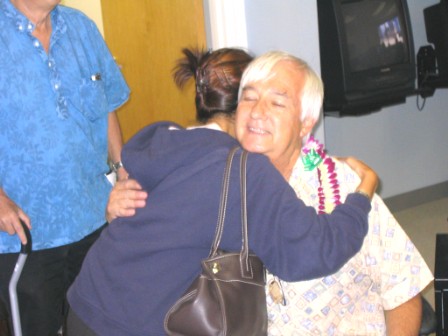
Bruce gets a lei from Rosemarie Bernardo
of the Honolulu Star-Bulletin
June 2004
Many thanks to the judges of the Ohio, Region 10 Pacific Northwest and Inland NW contests:
Broadcast:
April 20, 2004
To friends of Honolulu
Community-Media Council,
The Honolulu Community-Media Council's April program will be
exciting on two fronts. The Hawaii Chapter SPJ is a co-sponsor.
First, the featured speaker will be media politico and former
owner of KGMB- TV, Cecil Heftel.
And second, the forum will return to the Pacific Club for our
venue. World renowned Cordon Bleu trained chef Eric Leterc, who
previously worked with Alan Wong and the Manele Bay Hotel and has
prepared meals for such dignitaries as Sony founder Akio Morita,
French president Francois Mitterrand and Bill Gates, is now
executive chef at the Pacific Club.
Date: Tuesday, April 20
Time: 11:30am to 1:30pm
Place: The Pacific Club - Card Room
Cost: $20 members, $23 non-members
RSVP: By Friday, April 16
to hcmc@hawaii.rr.com
Feb. 21, 2004
Annual Dinner and Installation of
Beverly Deepe Keever
into the SPJ Hall of Fame
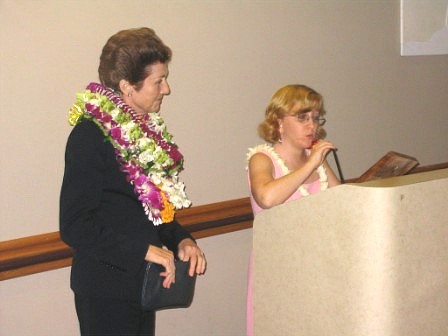
Chapter President Emily Viglielmo gives a plaque
to UH journalism professor Beverly Keever on her induction into the SPJ Hall of Fame.
Feb. 7, 2004
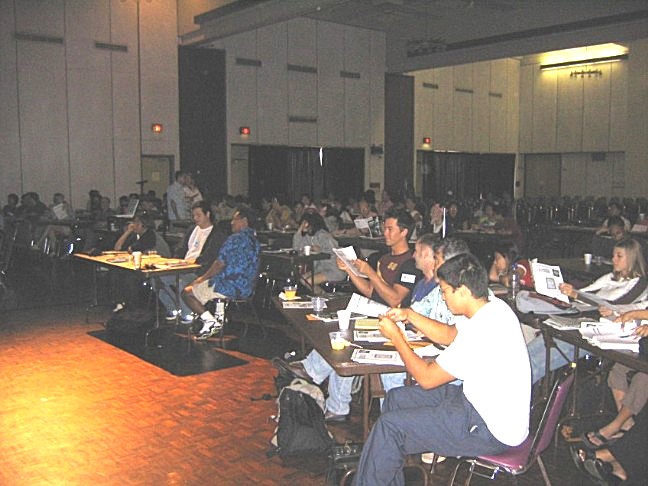
About 85 students and desing professionals attended the Design Quick Court put on by the Society for News Design and partly sponsored by the Hawaii chapter of the Society of Professional Journalists.
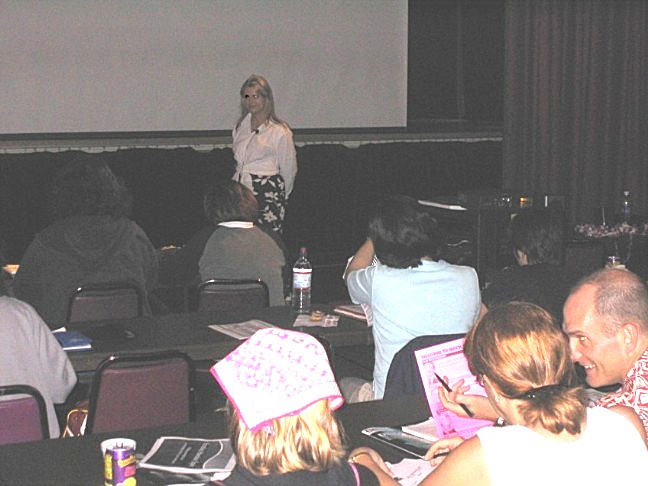
Nov. 8, 2003
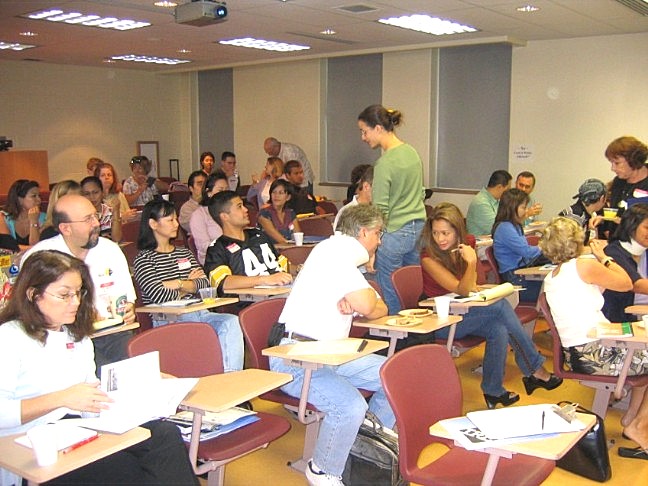
Better Watchdogs
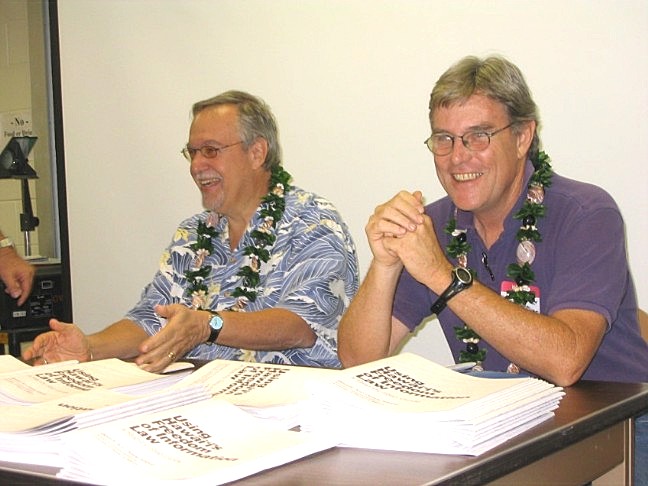
Media law attorney Jeff Portnoy and Honolulu Advertiser investigative reporter Jim Dooley
Some general tips from Brant Houston, executive director of Investigative Reporters and Editors:
Some basic tools or techniques:
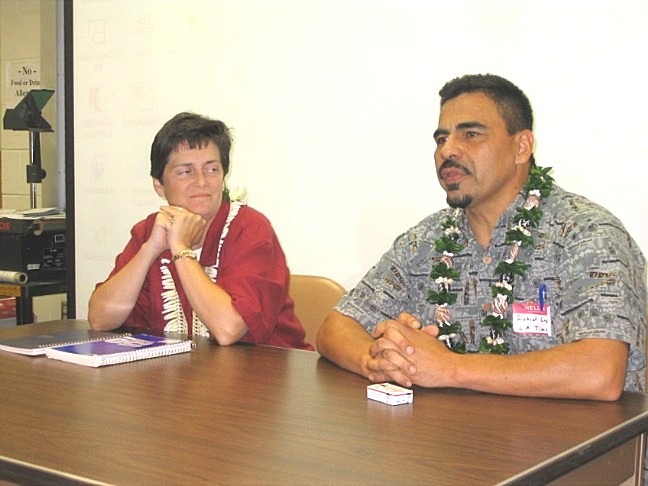
Seattle Times investigative reporter Cheryl Phillips and Los Angeles Times investigative reporter Robert Lopez
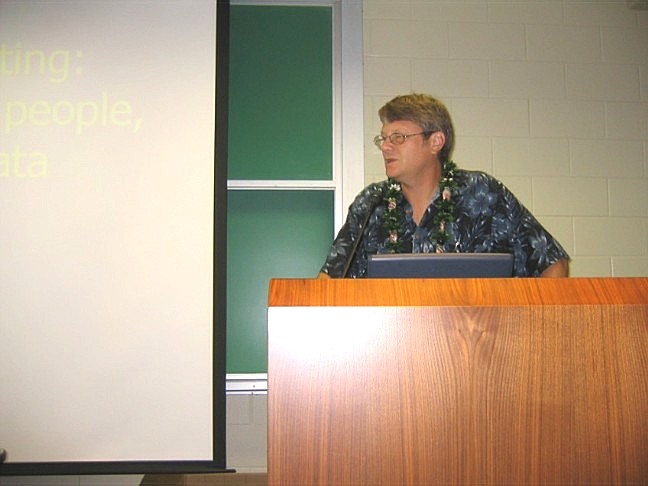
Brant Houston, executive director of Investigative Reporters and Editors
At the national convention Sept. 13, 2003, the chapter received this award based on the Gridiron show and the resulting internship program.
"In a world of unpaid internships for struggling student chapters, the small but effective Hawaii Pro Chapter funneled proceeds from its successful annual Gridiron show into 14 print, broadcast and public relations internships. The full- and part-time work comes with decent pay and offers an incredible variety of opportunities from wire services to trade publications. Full-time summer interns earn more than $3,200. The chapter seeks to find the best match for both the media outlet and the student. This was an innovative approach to encouraging collegiate journalism." -- Robert Leger, president
A Workshop for the Media on Accessing Census Data
You can find stories in what ethnic groups have the most degrees, figure out what areas car-pool the most, you can find out where your group's target audience is located. The list is endless.
A special workshop for reporters and journalists will be conducted on Wednesday morning, Sept. 3, 2003 at the University of Hawaii Hamilton Library. This workshop is designed to assist media professionals in accessing the vast amount of data available on line from the Census Bureau’s website www.census.gov.
The workshop will feature data from the final two files released for the state of Hawaii from Census 2000 with Summary File 4 providing the most extensive socio-economic data for Hawaii’s diverse population by race and ancestry. The workshop provides hands-on training to extract detailed information for Hawaii. Participants will learn how to access census data step-by-step from Summary Files 1, 2, 3, and 4 on the internet with emphasis on newly-released data from Summary File 4.
In addition, learn how to access demographic data from not only Census 2000, but data from current demographic surveys as well. Do your stories need maps or other geographic related information? We’ll show you how to pull census reference and thematic maps from the website also!
Date: Wednesday, September 3, 2003 8:00 to 10:30 a.m.
Location: University of Hawaii
Hamilton Library
Classroom 113 (computer lab)
Honolulu, Hawaii
Sponsors: Society of Professional Journalists
U.S. Census Bureau, Los Angeles Regional Office
To register for the free workshop, please call Stirling Morita at 529-4755 or
e-mail: spj@flex.com
Wednesday, March 12, 2003
Can Democracy Survive the Mass Media?
All Sander Vanocur wants is someone to ask the tough questions -- when it comes to the possible war with Iraq.
The former NBC newsman says reporters arenıt asking the right questions or getting them answered because they are afraid of being called a "liberal."
Questions about the Vietnam War in the early days got Vanocur labeled as a liberal. He says that hurt his career a bit.
"Thereıs just not a robust debate going on," he told the Honolulu Community-Media Council, Hawaii Chapter SPJ, Pacific-Asian Affairs Council and the East-West Center.
"Why is it (the war) in the public interest?"
Vanocur is in town as part of a distinguished lecture series by the University of Hawaii.
He spoke at the annual Freedom of Information Day luncheon at the IminCenter of th e East-West Center -- marking the birthday of James Madison, regarded as the author of the First Amendment.
The topic of his talk was "Can Democracy Survive Mass Media?"
The news media should be asking the president and his administrators such questions as:
-- How much is the war going to
cost and how are we going to pay for it?
-- Does the president have the authority to go to war?
Such coverage is likely to stay that way until there is bloodshed or the war becomes lengthy, he said.
"I raise these questions because itıs my nature," Vanocur said. "I love this craft of journalism. I want to see it be more and more an examiner of conventional wisdom."
Generally, there has been a debasement of the news media -- which tracks the degradation of taste in the culture, he said.
The news cycle used to be print-oriented with a.m. and p.m. cycles.
Now, itıs 24 hours a day with television, radio and computers.
There seems to be "a plethora of gas bags (on television) who could not cover a two-car funeral," he said.
These newspeople "don't give us facts or reasoning. They give us opinions."
Vanocur said journalism is a craft, not a profession.
When he started in the business,
"we took our work seriously, but not ourselves,"
Vanocur said.
Persian Gulf War started the 24/7 style of News Reporting
Frank Rich
1/21/03
Frank Rich says the Persian Gulf war started the 24/7 (24 hours a day, 7 days a week) style of news reporting.
With the war, "CNN was put on the map," and it "created a whole new form of news," Rich said.
It was the first war with its own logo. And it was the first war with its own theme music. It also created a group of news media "stars."
Rich, associate editor and op-ed columnist for the New York Times, spoke to the Honolulu Community-Media Council and the Hawaii chapter on Jan. 21 at the Pacific Club. Rich was in town as part of the University of Hawaii distinguished lecture series.
After the Gulf war, it was the O.J. Simpson trial.
The trial presented a different problem: While the war provided news for 24-hour coverage, the trial had long periods of inactivity to fill, Rich said.
"They had to look for ways to keep us interested," he said.
The news shows brought in experts to justify the time devoted to this "soap opera," he said.
Princess Diana’s death was another story that took up 24-hour coverage over several days with very little news. Some people were brought in to talk abut how they knew her or how they had dined with her, Rich said.
Then with the airplane crash that killed John Kennedy Jr., the 24/7 system went a step further: There was fiction attached to the story.
Then it was coverage of the Clinton sexcapade.
But fueling some of the coverage of Clinton was two developments:
-- The advent of the Internet. Just before the intern scandal broke, the Internet had become a medium viewed by regular people, not just geeks.
-- Two competing cable television news shows.
Rich said the resulting hysteria "was so disproportionate to the news."
Then 9/11 brought it around and the news media did a credible coverage: The hysteria level was kept down and rumors and false information weren't disseminated.
He criticized the binge coverage over Iraq. With slogans of "Countdown to Iraq," it drowns out other important news such as the economy or dissent with going to war, Rich said.
1/3/03
Between Project Censored and a Police State
Peter Phillips
There is a media democracy spreading across the world on the Internet and in alternative newspapers, says Peter Phillips, director of Project Censored.
Phillips is happy to see that because it means more important stories will reach the public rather than get clogged in or dismissed by conventional corporate media, he said.
It became evident after the demonstrations in Seattle about the World Bank and has crossed many borders thanks to "people in the street and activists," Phillips said in a talk to the Hawaii chapter SPJ, Honolulu Community-Media Council, Akaku viewers and Honolulu Weekly readers.
"Many people (reporters, editors) who believe in the First Amendment, the public’s right to know ... are seeing increasing restrictions – many self-imposed restrictions (on their stories)," he said, referring to reporters worrying about their career or offending company board members or advertisers.
Phillips’ organization – made up mostly of 100 students from Sonoma State University in California -- collects the important stories that aren’t reported or underplayed by American news media and publishes a book annually on the top 25 censored stories,
One of those stories was that Americans bombed Iraqi water and sewage system during the Gulf War, he said. On top of that, chlorine to clean up the water supply was blocked from entering the country because it was on a list of prohibited supplies, Phillips said. That led to contamination of Iraqi water supplies. Soon people were dying from fecal contamination.
The national news media are not using other sources of information, relying on the Pentagon as the authoritative source, he said.
Phillips also noted that the FBI wouldn’t answer who owns airline stock after the law enforcement agency reviewed the ownership after the Sept. 11th terrorist attacks.
"These are the kinds of questions we used to ask, but we don’t do it anymore," Phillips said.
Also the media have to keep an eye on the federal security forces monitoring people’s personal information in the war on terrorism.
For example, federal agents can now monitor an individual’s credit card and other personal information to spot potential terrorists. Under the law, a person wouldn’t even know if the agents were gathering his or her personal, financial information.
"The national-security state got everything after 9/11," Phillips said.
a
10/30/02

Panelists Jacqueline Parnell, Richard S. Miller, Chad Blair and Bob Watada
When does campaigning become unfair and unethical?
Honolulu Advertiser columnist Dave Shapiro says negative campaigning isn’t necessarily bad.
But he told those gathered at a forum on "Campaigns: Where to Draw the Line" the negative information should be accurate and fairly presented – and relevant to the campaign.
For example, he said, it is OK for Democratic gubernatorial candidate Mazie Hirono to question Republican opponent Linda Lingle’s record as mayor of Maui on which Lingle has been running. On the other side, it is proper for Lingle to question what Hirono has done in her political career.
As long as the questioning is done in a fair, accurate and relevant manner, Shapiro said.
"Do we really want a totally ‘Don’t talk stink’ campaign?" he said, noting that voters would have nothing to gain from nothing but "platitudes" without challenges from candidates.
Shapiro was on a panel of experts at the forum sponsored by the Hawaii Pro-Democracy Initiative, University of Hawaii School of Journalism and the Hawaii professional and student chapters of the Society of Professional Journalists. It was held at the Richards Street YWCA.
Shapiro said it is up to voters to do some work and find out about candidates. "The only way it (dirty campaigning) will change is if voters inform themselves and vote for people who do what they like or against people who do what they don’t like."
Richard S. Miller, UH professor emeritus of law and public interest advocate, said the state has a fair campaign code but it is not enforceable because the courts have ruled that to do so would trample on protections for political speech.
The only way there is some recourse is if the political attack was done maliciously – that is if the information was not true and the candidate knew it was not true or had doubts that it was not true, Miller said.
"That means you have to get inside someone’s mind," which is difficult, he said.
The main recourse is to make the false attack public to let voters know about it so they can act accordingly, Miller said.
Bob Watada, executive director of the state Campaign Spending Commission, said 75 percent of the candidates will sign the pledges for fair campaigning. "It really doesn’t make a difference, and they will go off and do what they want to do," he said.
Jacqueline Parnell, director of the Hawaii Pro-Democracy Initiative and vice president of the League of Women Voters, said only two candidates refused to sign the initiative group’s campaign ethics code.
She said the only power to enforce the code is put the offense in the news media.
Chad Blair, associate editor of Honolulu Weekly and Hawaii Pacific University political science lecturer, said research shows that negative advertising works.
He noted that judging from feedback from some of his students, the negative ads against Lingle are "having some effect."

Panelist Dave Shapiro
9/23/02
UPI Photo
Hawaii Chapter co-sponsors Helen Thomas lecture
The longtime dean of the White House Press Corps, Helen Thomas, gave the annual Carol Burnett Fund for Responsible Journalism lecture, titled "Thank You for the Memories, Mr. President," based on her latest book.
The free lecture, the first in a series of Distinguished Lectures at the University of Hawaii, was Monday, Sept. 23, in the Campus Center Ballroom. It was co-sponsored by Carol Burnett Fund for Responsible Journalism, the Hawaii chapter, SPJ and UH-Manoa.
SPJ members are joined journalism students and faculty in an informal session with Thomas Tuesday, Sept. 24, in the Campus Center meeting rooms (third floor).
Thomas resigned in May 2000 after 57 years with United Press International.
Other events included:
Sunday, Sept. 22 Borders Book Signing (Ward Centre store) - 2 p.m.
Monday, Sept. 23, 9:30-11 a.m., meeting with journalism students at Waialua High School on the North Shore.
Tuesday, Sept. 24, Remarks to Media Council luncheon at Pacific Club.
Wednesday, Sept. 25, noon speech to students and faculty at UH-Hilo.
3/18/02
Dobelle says UH will liberally construe open records laws
University of Hawaii President Evan Dobelle says he wants to say yes -- to open government records and meetings.
But he complains of inheriting an "entrenched" bureaucracy that tends to say no.
That bureaucracy "has been trained to hide things. It’s been trained to keep people in the dark, and it’s a culture that has built up," he said.
Dobelle told a Freedom of Information Day luncheon on March 18 that he wants to make the bureaucracy less negative to release of information.
The new UH president spoke at the luncheon sponsored by the Honolulu Community-Media Council, the Society of Professional Journalists, Hawaii Professional and Student chapters, the East-West Center and Ka Leo O Hawaii.
Dobelle used as an example of his attempt to be open about university business: the fast-tracked bidding process for construction of the new medical school in Kakaako,
"We made a commitment early in the process that we would be open, that we would involve the public in decision-making process to the greatest extent possible," Dobelle said.
"... There is a new way of doing business across the UH system: It is quick without being hasty. It is empowered without sacrificing accountability. It is visionary without having lost touch with reality. And it is inclusive without being bureaucratic."
Dobelle said he is going to try to open the Manoa chancellor selection process.
He suggested that the search committee fly in the top three to five candidates on a Thursday night to appear before faculty, students, Board of Regents and legislators on Friday and Saturday.
Then on that Sunday, he would interview them and make a decision.
The candidates’ names would only appear in the news media on Saturday and Monday, he said.
The problem is when candidates’ names are released and the search process is dragged out for weeks or even months -- which he called "disabling."
He acknowledged that candidates might balk at having their names made public.
After some questions about hiring and salary procedures, Dobelle said some things will change.
"Henceforth, the university’s administration will follow the intent of Hawaii’s laws that the provisions requiring open meetings and open records shall be liberally construed."
Media Council Chairman Jeff Portnoy, a media lawyer, noted that he had a client who considered a lawsuit to get access to Dobelle’s contract.
But later, another client of his notified him that Dobelle released it on his own.
UH gets Lava Tube Award
The Big Island Press Club has given the University of Hawaii Board of Regents its Lava Tube Award for shrouding actions in darkness.
The Press Club cited the secrecy over setting President Evan Dobelle’s $442,000 salary and for failing to disclose the terms of a lawsuit settlement involving a researcher.
1/19/02
Annual dinner honors Helen Chapin, Bud Smyser
Helen Chapin, retired Hawaii Pacific University vice president, revisited the diverse history of Hawaii’s news media. She spoke at the annual Hawaii chapter meeting at the Imin Center at the East-West Center on Jan. 19.
Chapin, also an author, was installed into the chapter’s Hall of Fame. Larry LeDoux went over Chapin’s career.
Click here to go to the Hall of Fame
Bud Smyser Remembrance by Helen Altonn
Star-Bulletin reporter Helen Altonn recalled the insatiable curiosity of longtime editor A.A. "Bud" Smyser, who died in March. He also was honored. His widow Dee Smyser received a plaque calling Bud Smyser "a beloved gatekeeper" in local journalism.
11/05/01
Election results for 2002
For 2002, the chapters officers will be president, Stirling Morita; vice president, Donalyn Dela Cruz ; treasurer, Craig DeSilva; and secretary, Larry LeDoux. Christie Wilson remains on the board as immediate past president.
Directors will be: Jean Christensen, Garett Kamemoto, Susan Kreifels and Emily Viglielmo.
9/5/01
Jeff Alan would like to get American journalism back into the public’s trust.
"The public doesn’t trust the media as a whole," the St. Louis television news director said. "We need to get back to real journalism and back to the media the public's trust."
That’s the reason Alan wrote the book "Responsible Journalism."
Alan outlined his book – just on bookshelves – to 25 Hawaii Pacific University students and Hawaii chapter, SPJ, members at the HPU downtown campus.
The media need to stop making mistakes, need to get back to truth-telling and attribute stories – among other things, Alan said.
He gave this step-by-step approach:
Alan advises reporters to let people talk. "You’re better off." Don’t interrupt with questions. You get better quotes that way.
He has found that going back to the families several days later has worked. His crews tell the families that they would like to put together a video memorial to the victim that the families could keep and the stations could air..
He blames the competition among 24-hour news outlets for part of the problem. "They want to disseminate information instantly," which can lead to mistakes being broadcast, Alan said. "No one is stepping back to stop to check for accuracy."
Alan said his book contains "a bunch of (media) mistakes" and some good examples of journalism.
"I learned more about journalism by talking to people in putting this book together," he said.
The book can be ordered from Amazon.Com
8/11/01
DA WRITE STUFF
Frame that story, Shapiro says
Dave Shapiro says half the battle to writing a good news story is preparation.
"If you don’t have the story in your notebook when ou sit down at the terminal, it’s not going to appear on the screen," Shapiro, former Star-Bulletin managing editor and Advertiser columnist, told reporters at Da Write Stuff forum Aug. 11 in a KHON Fox 2 conference room.
Noting he once was the kind of writer who agonized over getting a paragraph right, Shapiro advised the reporters to find out "what kind of writer you are."
Competition for time on the Teletype and dictation forced to learn how to write quickly.
One way to learn to write quickly and in an organized fashion is what Shapiro calls framing.
Frame the story, he said repeatedly, whether the focus be broad or narrow.
"You can’t go reporting blindly," he said.
Reporters should have "a working premise on what your stories are. It allows you to be on top of your story," Shapiro said.
Like a cameraman, zoom in or pan out, but concentrate on the items in the frame, he advised the reporters.
While reporting, "ask framing questions," he said. Once you answer the first framing question, it probably will be your lede, and it will lead to other framing subquestions that could be subsequent paragraphs. This will lead to fast writing and leave time for a reporter to come back and add eloquence or colorful details.
Examples are: "What do I want to get out of this meeting? What are the different possibilities?"
"Always think of writing the story while you’re reporting it," he said.
Then a reporter must prioritize his or her information.
"Pay attention to key paragraphs: lede paragraph, nut graf, transitional grafs," Shapiro said.
Other points to watch for:
Locations of Da Write Stuff have been changed to KHON Fox 2 newsroom conference room, 88 Piikoi St.
8/9/01
Thursday, Aug. 9, 2001
FOR IMMEDIATE RELEASE
CONTACTS:
Ray Marcano, SPJ president, 937/225-2323 or rmarcano@coxohio.com
Ian Marquand, SPJ Freedom
of Information Committee chairman, 406/542-4400
or ian@kpax.com
REPUBLIC OF NAURU SHOULD NOT BAN JOURNALIST FROM COVERING SUMMIT
INDIANAPOLIS - The Society of Professional Journalists sent a
letter to the
Republic of Nauru today urging the country not to ban a
journalist from
covering next week's Pacific Islands Forum in Nauru.
Michael Field, a correspondent in New Zealand and the South
Pacific for
Agence-France Presse (AFP), one of the world's major news
agencies, was
banned from entering the Republic of Nauru to cover the 16-nation
meeting.
Secretary for Foreign Affairs in Nauru, Angie Itsimaea, wrote
Field saying
he had no media accrediation. The country, however, has stated no
official
reason for banning Field from the country.
Field has reported stories on Nauru's tax haven banking problems
and
alleged links to the Russian Mafia - stories not well-received by
Nauru's
government
"Journalists should never be banned from covering events
simply because
someone doesn't like what they've written," said SPJ
President Ray Marcano,
an assistant managing editor at the Dayton (Ohio) Daily News.
"Mr. Field is
being punished because he's written the truth, and that's of
grave concern
to journalists worldwide. We urge the government to reverse
course and let
Mr. Field do his job - objective, unbiased reporting, whether or
not the
government likes what it reads."
Field also was banned from the 2000 Forum summit in Kiribati. The
country
said it did not agree with Field's coverage of environmental
decay on the
main island or his reports of a Chinese satellite tracking base
in the
country.
"In today's information world, countries that block
journalists from doing
their work do so at their peril. Nauru is one of the Southern
Hemisphere's
newer republics and, from what I've learned, has accomplished
quite a bit
for the benefit of its people since its independence," said
Ian Marquand,
SPJ Freedom of Information chairman and special projects
coordinator for
KPAX-TV in Missoula, Mont. "Denying entry to Michael Field
out of apparent
spite sends a message that Nauru will not tolerate dissenting
opinions.
That's entirely the wrong message for a modern republic to send
abroad and
to its own people."
A copy of Marcano's letter to Nauru will be posted online at
www.spj.org/news/080901_letter.htm.
The Society of Professional Journalists works to improve and
protect
journalism. The organization is the nation's largest and most
broad-based
journalism organization, dedicated to encouraging the free
practice of
journalism and stimulating high standards of ethical behavior.
Founded in
1909 as Sigma Delta Chi, SPJ promotes the free flow of
information vital to
a well-informed citizenry; works to inspire and educate the next
generation
of journalists; and protects First Amendment guarantees of
freedom of
speech and press.
-END-
Sarah A. Shrode
SPJ Director of Communications
Society of Professional Journalists
Eugene S. Pulliam National Journalism Center
3909 N. Meridian St.
Indianapolis, IN 46208-4045
317/927-8000 ext. 217
sshrode@spj.org
8/9/01
The Chapter has sent a letter questioning the exclusion of Agence France Presse correspondent Michael Field from Nauru and from covering the Pacific Island Forum next week.
The chapter sought the reasons for the exclusion.
In an e-mailed letter to
Michael Dekarube, director of media, Nauru Media Bureau, Stirling
Morita, chapter president, said: As you are aware, there are few
if any legitimate reasons in a democratic society for barring
press coverage of an event.
Freedom of Information Issues in 2001: An Evening with Media Attorney Jeff Portnoy
"Defeat is far worse than doing nothing"
- Jeff Portnoy on SPJ FOI legal efforts
By Donalyn Dela Cruz
Chapter Vice President
The SPJ Hawaii Chapter has tasted success in the courts when it comes to fighting for FOI. But media attorney Jeff Portnoy recently reminded SPJ that 2001 has been a bad year for open government.
Portnoy explained the political leadership in Hawaii has led to a philosophy in the current legal system which is likely to not favor an open government, ultimately threatening FOI efforts in courts. Portnoy discussed this issue in detail at SPJ's recent program, Freedom of Information Issues in 2001: An Evening with Media Attorney Jeff Portnoy. The event took place at the new Associated Press Bureau at the Waterfront Plaza at 5 p.m. July 13.
Portnoy referred to a series of legal defeats over the last six months including SPJ's loss in the Board of Regents lawsuit.
Portnoy said there had been "prior victories and now the media is losing." He said, "Why is this happening, I don't really know. Maybe it's a bad luck of the draw of judges or just bad decisions."
Portnoy said there are many issues that the media is not reporting on. The media, he said, has had its share of damaging itself. Portnoy reffered specifically to KHON reporter Bill Brennan taking the stand in the Andy Mirikitani case.
"It was the very first time in over a decade that a reporter was forced to testify. It is extremely damaging. He gave the names of sources, but one of whom had testified before the judge - before he took the stand. The fact that a reporter was forced to testify has a devasting effect on reporters."
Portnoy criticized the lack of investigative reporting. He said there was a time when he represented a number of FOI cases on behalf of the media. Now he is hardly ever in court. Portnoy said it's a sign that the media is falling behind in the courts. He said SPJ has a responsibility to lead the way for an open government. "Defeat is far worse than doing nothing," he said.
Portnoy addressed questions on current politicians being media friendly. He said former Gov. John Waihe'e was very media friendly by creating a more open government.
However, the current governor has a different philosophy towards open government. "Hawaii is now one of the most closed in open government in the country. In the '70s and late '80s, we made big strides, this decade has not had as much success."
Portnoy said the media's best allies for an open government are the Republicans. "The Republicans are clamoring for an open government because they've been shut out. If someday they take power, they may forget, but for now, they are our best allies."
Before ending, Portnoy stressed the media's duty to be more aggressive in pushing for an open government. He said more editorials need to be written especially on officials who are doing things to keep a closed government.
The courts should be the last resort in fighting for open government. He said SPJ needs to be at the forefront, "Whenever something happens that threatens FOI, SPJ should react immediately. Make noise, get in the papers." More importantly reporters need to step up their reporting on officials who are closing the doors on open government.
*************************
Here are the three courtroom losses for the news media:
A judge turned down a request by KITV and the Honolulu Star-Bulletin to open a confidential settlement between Campbell Estate and a law firm.
Another Circuit Court judge rejected the bid by the Hawaii chapter, SPJ, to require the University of Hawaii Board of Regents decide the new UH president's pay in an open meeting.
A U.S. District Court judge ordered KHON reporter Bill Brennan to testify about whether and what certain people talked to him about Councilman Andy Mirikitani's case.
The 2001 Excellence in Journalism awards dinner was held at the Sheraton Princess Kaiulani, 120 Kaiulani Ave., Robert Louis Stevenson Room.
Many thanks to Christie Wilson, Garett Kamemoto, Aimee Harris, Jade Moon and Keoki Kerr.
The Hawaii chapter received 273 entries in the Excellence in Journalism competition.
That is below last year’s total of 335.
Competition was fierce in quite a few categories.
Right now, the San Diego chapter is judging our entries.
Local journalists are now judging the San Diego entries.
Judging coordinators are:
Wanda Adams
Margret Arakaki
Duncan Armstrong
Donica Croot
Craig DeSilva
Donalyn Dela Cruz
Jim Dooley
Anthony Ferreira,
Bryant Fukutomi
Craig Gima
Sharif Goldstein
Aimee Harris
Linda Hosek
Wilma Jandoc
Tom Levy
Garett Kamemoto
Keoki Kerr
Elizabeth Kieszkowski
Crystal Kua
Stacy Loe
FL Morris
Bob Loy
Ken Mashiyama
Stirling Morita
A. Kam Napier
John Nunes
Dennis Oda
Pat Omandam
Darren Pai
Derek Paiva
Rob Perez
Dave Reardon
Suzanne Roig
Glenn Scott
Treena Shapiro
Jaymes Song
Gary Sprinkle
Curt Thackeray
Catherine Toth
Alan Vaughn
Pamela Young
Lucy Young-Oda
OK, Gridiron fans, we’ve tentatively scheduled the 2001 show for Oct. 19-20 at Diamond Head Theatre.
Keoki Kerr is looking for writers, performers and volunteers.
If you have something that might tickle some people from the past year’s events, just e-mail Keoki at kkerr@kitv.com
If you’d like to volunteer for something, just e-mail Keoki.
Stafford Kiguchi has done such a good job of rounding up ads that he has already locked one up. Chevron has sent the chapter a check for the 2001 performance.
Census Bureau shows how to use data
Learn how to enhance your stories with census data.
Jerry Wong of the Census Bureau will be in Honolulu to teach reporters how to find and use census data.
He will give a workshop at 10 a.m. Saturday, May 5, in a conference room at the new Star-Bulletin office, 500 Ala Moana Blvd., Tower 7, Suite 210.
RSVP required because of security on Saturdays. Call Stirling Morita at 529-4755.
Tao retired recently as editor of the Hawaii Tribune-Herald after more than 30 years in the business. Shapiro will retire in March, also after 30 years in Hawaii journalism.
Both were honored as the first inductees in the SPJ-Hawaii Hall of Fame at the annual chapter dinner Jan. 20 at Hee Hing restaurant, 449 Kapahulu Ave.
To qualify for the SPJ-Hawaii Hall of Fame, a person must contribute to:
Advancement of journalism through writing, editing, education, direction or reporting for more than 10 years.
Tutelage of others, advancing them through the ranks.
Supporting and promoting the SPJ chapter and its goals or taking steps to promote the First Amendment for others as well as themselves.
Gordon Y.K Pang had the audience laughing with his acapella version of the "House of the Rising Tao."
Jim Wilson of the Hawaii Tribune Herald told of Tao's 225 golfing scores.
Shapiro noted Tao's work ethic. Gene had told him his hours were from 10 to 5. "I did the math, and that came out to only a seven-hour workday."
Tao did a "Kung-fu"esque parody of how he made Dave Shapiro "what he is today."
"Picture a young Dave Shapiro … kneeling before me in a temple in Wood Valley on the Big Island … his head bowed … smoke from incense wafting in front of an altar.
"Dave says: Master … master
"I say: Yes, grasshoppah
"He continues: I wish to learn the way of becoming a truly great editor.
"I say: Hmmmm, are you sure you wish to tread down this path? It can be rocky, full of cracks, pitfalls, tons of bad copy.
"Dave says: There must be a path to enlightenment … there must be steps to attain Nirvana. I want to tell reporters what to do … I want to cut their stories – rather than have that happening to me.
"I reply: There are many paths – the seven steps of vanity … the four steps of rudeness … the one step of luck. But there is only one true path to Editor Heaven: … the way to inscrutability. There is no clear way to the top with this path. It is windy and you can end up where you started. Are you sure you’re ready for this? Are you ready to sacrifice your sanity? Your innocence?
"Dave says: Please, master, help me. I am very mixed up. I am a Jewish boy who rides motorcycles … wants to be a human being and wants to be an editor at the same time … mixes Taoism with Christianity, Hinduism and Buddhism.
"I tell him: You must purify your mind as well as your hormones. You must stop going to these Protestant churches to pick up women.
"I walked away. He was mumbling something."